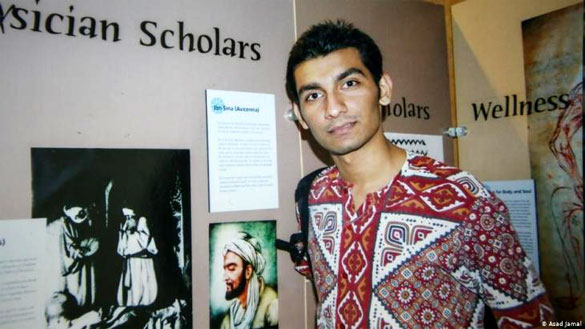Blasphemy Laws Have Turned Muslim Countries into Killing Fields
Muslims
and Non-Muslims Alike Can Be Killed For Blasphemy in Pakistan
Main
Points:
·
In Pakistan 1500 people are being prosecuted
under blasphemy laws.
·
70 people have been killed since 1990 extra
judicially for alleged blasphemy.
·
Quran does not prescribe any physical sentence
for blasphemy.
·
Apostasy is also included in blasphemy.
·
Blasphemy is a political tool to suppress
dissent in Muslim countries.
-----
New
Age Islam Staff Writer
12 October
2021
Blasphemy
or sacrilegious speech or writing is widely debated in the academic circles of
Islam. Many Islamic scholars are of the view that blasphemy is not a crime but
a grave sin against God and His prophet pbuh and so it cannot be punished by
the law, God condemns blasphemy against Himself, His angels and His prophets
(not only Prophet Muhammad pbuh) but the Quran does not prescribe any physical
punishment for blasphemers. Instead, the Quran advises Muslims to practice
restraint and tolerance in face of blasphemy.
But a
section of the Islamic scholars in the 11th century in association with the
power hungry Muslim rulers made blasphemy a criminal offence to be punished by
death. These ulema presented interpretations and explanations of Quranic verses
supporting punishment for blasphemy. For example, Islamic scholar of the 11th
century Imam Ghazali presented the view that those propagating unorthodox views
on God and resurrections should be punished to death as they were influenced by
the Greek philosophy and Shias to corrupt Sunni Islam. After that a number of
Muslim scientists and philosophers were tortured and executed.
This
tradition of considering blasphemy a criminal offense in Islam was taken
forward and even strengthened by some ulema of the 20th century though at the
same time a section of liberal ulema opposed the idea of punishment for
blasphemy on the basis of the verses of the Quran that advise Muslims to
practice restraint and leave the blasphemers only after verbally condemning
them. But the majority of the modern ulema, even the ulema of 21st century,
blasphemy is a criminal offence and should be punished with no less a punishment
than death.
Interestingly,
it has been observed that ulema from Muslim majority countries favour death
sentence for blasphemers and ulema from Muslim minority countries favour only
verbal protest and condemnation. For example, Maulana Wahiduddin Khan, an
Islamic scholar from India held the view that Quran did not prescribe death for
apostasy. Similar view is held by Muhammad Yunus, a scholar of the Quran and
other Islamic scholars of India. But on the contrary, majority of ulema of
Pakistan hold the view that blasphemy should be punished with death.
It is to be
noted that these ulema have included apostasy in the category of blasphemy.
Though the Quran does not prescribe death for apostasy too, the ulema cite the
consensus of majority of ulema for declaring apostasy a kind of blasphemy and
so punishable by death.
Though many
Christian countries have repealed their blasphemy laws or have light
punishment, many Muslim majority countries have blasphemy laws under which
hundreds of Muslims and non-Muslims are prosecuted and killed extra judicially.
In Pakistan
and Iran the blasphemy laws are the strictest. In Pakistan, members of minority
communities --- Hindus, Christians, Ahmadiyyas, Shias and other people
expressing unorthodox views about religion are charged with blasphemy but no
convictions take place. Still the accused are killed by mob or extremists
outside the court. About 70 people have been killed extra judicially after the
cases against them did not stand in the court. This is a very disappointing
situation when the law framed with the approval of the hardline ulema does not
find the accused guilty and still they are killed extra judicially.
In Pakistan
anyone can be charged with blasphemy even if he challenges the behavior of the
clergy. This should change. Liberal thinkers and intellectuals of Pakistan
raise their voice against this tradition but they are always under threat.
Salman Taseer, the Punjab governor was killed by an extremist for demanding a
repeal of the blasphemy laws. The situation seems hopeless as even an Islamic
scholar of the status of Dr Tahir ul Qadri who had published a voluminous fatwa
against suicide bombings and terrorism supports death for blasphemy and holds
the view that even Muslims can be charged with blasphemy.
------
Why Blasphemy Is A Capital Offense
In Some Muslim Countries

By
Ahmet T. Kuru, San Diego State University
(Photo courtesy:
Qantara.de)
----
The Prophet Muhammad never executed anyone for
apostasy, nor encouraged his followers to do so. Nor is criminalising sacrilege
based on Islam’s main sacred text, the Koran. In this essay, Ahmet Kuru exposes
the political motivations for criminalising blasphemy and apostasy
Junaid
Hafeez, a university lecturer in Pakistan, had been imprisoned for six years
when he was sentenced to death in December 2019. The charge: blasphemy,
specifically insulting Prophet Muhammad on Facebook.
Pakistan
has the world’s second strictest blasphemy laws after Iran, according to U.S. Commission on International
Religious Freedom.
Hafeez,
whose death sentence is under appeal, is one of about 1,500 Pakistanis charged
with blasphemy, or sacrilegious speech, over the last three decades. No
executions have taken place.
But since
1990 70 people have been murdered by mobs and vigilantes who accused
them of insulting Islam. Several people who defend the accused have been
killed, too, including one of Hafeez’s lawyers and two high-level politicians who
publicly opposed the death sentence of Asia Bibi, a Christian woman convicted
for verbally insulting Prophet Muhammad. Though Bibi was acquitted in 2019, she fled Pakistan.
Blasphemy
and Apostasy
Of 71
countries that criminalize blasphemy, 32 are majority Muslim. Punishment and
enforcement of these laws varies.
Blasphemy
is punishable by death in Iran, Pakistan, Afghanistan, Brunei, Mauritania and Saudi Arabia. Among non-Muslim-majority cases,
the harshest blasphemy laws are in Italy, where the maximum penalty is three
years in prison.

Junaid Hafeez was a lecturer in English
literature at Bahauddin Zakariya University in Multan, Pakistan. Appointed in
2011, he soon found himself targeted by an Islamist student group who objected
to what they considered Hafeez's "liberal" teaching. On 13 March,
2013 Hafeez was arrested – accused of using a fake Facebook profile to insult
the Prophet Muhammad in a closed group called "So-Called Liberals of
Pakistan". Imprisoned without trial for six years, much of that time spent
in solitary confinement, the academic was finally sentenced to death in
December 2019
-----
Half of the
world’s 49 Muslim-majority countries have additional laws banning apostasy, meaning people may be punished for
leaving Islam. All countries with apostasy laws are Muslim-majority except
India. Apostasy is often charged along with blasphemy.
This class
of religious laws is quite popular in some Muslim countries. According to a
2013 Pew survey, about 75% of respondents in
Southeast Asia, the Middle East and North Africa, and South Asia favour making
sharia, or Islamic law, the official law of the land.
Among those
who support sharia, around 25% in Southeast Asia, 50% in the Middle East and
North Africa, and 75% in South Asia say they support “executing those who leave
Islam” – that is, they support laws punishing apostasy with death.
The
Ulema and the State
My 2019
book “Islam, Authoritarianism, and
Underdevelopment”
traces the root of blasphemy and apostasy laws in the Muslim world back to a
historic alliance between Islamic scholars and government.
Starting
around the year 1050, certain Sunni scholars of law and theology, called the
“ulema,” began working closely with political rulers to challenge what they considered
to be the sacrilegious influence of Muslim philosophers on society.
Muslim
philosophers had for three centuries been making major contributions to mathematics, physics and medicine. They developed the Arabic number system used across the West today and
invented a forerunner of the modern camera.

A conspiracy against Sunni Islam? For three centuries,
Muslim philosophers had been making major contributions to mathematics, physics
and medicine, developing the Arabic number system used across the West today
and inventing a forerunner of the modern camera. Yet the conservative ulema
felt these philosophers were inappropriately influenced against Sunni beliefs
by Greek philosophy and Shia Islam. Their views were reinforced by the
brilliant and respected Islamic scholar al-Ghazali, who declared two long-dead
leading Muslim philosophers, Farabi and Ibn Sina (a.k.a. Avicenna), apostates
for their unorthodox views on God’s power and the nature of resurrection. Their
followers, al-Ghazali wrote, could be punished with death
------
The
conservative ulema felt that these philosophers were inappropriately influenced
by Greek philosophy and Shia Islam against Sunni
beliefs. The most prominent in consolidating Sunni orthodoxy was the brilliant
and respected Islamic scholar Ghazali, who died in the year 1111.
In several
influential books still widely read today, Ghazali declared two long-dead
leading Muslim philosophers, Farabi and Ibn Sina, apostates for their
unorthodox views on God’s power and the nature of resurrection. Their
followers, Ghazali wrote, could be punished with death.
As
modern-day historians Omid Safi and Frank Griffel assert, Ghazali’s declaration
provided justification to Muslim sultans from the 12th century onward who
wished to persecute – even execute – thinkers seen as threats to conservative
religious rule.
This
“ulema-state alliance,” as I call it, began in the mid-11th century in Central
Asia, Iran and Iraq and a century later spread to Syria, Egypt and North
Africa. In these regimes, questioning religious orthodoxy and political
authority wasn’t merely dissent – it was apostasy.
Wrong
Direction
Parts of
Western Europe were ruled by a similar alliance between the Catholic Church and
monarchs. These governments assaulted free thinking, too. During the Spanish
Inquisition, between the 16th and 18th centuries, thousands of people were
tortured and killed for apostasy.
Blasphemy
laws were also in place, if infrequently used, in various European countries
until recently. Denmark, Ireland and Malta all recently repealed their laws.
But they
persist in many parts of the Muslim world.
In
Pakistan, the military dictator Zia ul Haq, who ruled the country from 1978 to
1988, is responsible for its harsh blasphemy laws. An ally of the ulema, Zia updated blasphemy laws – written by British colonizers to
avoid interreligious conflict – to defend specifically Sunni Islam and
increased the maximum punishment to death.
From the
1920s until Zia, these laws had been applied only about a dozen times. Since then they have become a
powerful tool for crushing dissent.
Some dozen
Muslim countries have undergone a similar process over the past four decades,
including Iran and Egypt.
Dissenting
Voices in Islam
The
conservative ulema base their case for blasphemy and apostasy laws on a few
reported sayings of Prophet Muhammad, known as hadith, primarily: “Whoever changes his religion, kill
him.”
But many
Islamic scholars and Muslim intellectuals reject this view as radical. They
argue that Prophet Muhammad never executed anyone for apostasy, nor encouraged
his followers to do so.
Nor is
criminalizing sacrilege based on Islam’s main sacred text, the Quran. It
contains over 100 verses encouraging peace, freedom of conscience and religious
tolerance.
In chapter
2, verse 256, the Quran states, “There is no coercion in religion.” Chapter 4,
verse 140 urges Muslims to simply leave blasphemous conversations: “When you
hear the verses of God being rejected and mocked, do not sit with them.”
By using
their political connections and historical authority to interpret Islam,
however, the conservative ulema have marginalized more moderate voices.
Reaction
to Global Islamophobia
Debates
about blasphemy and apostasy laws among Muslims are influenced by international
affairs.
Across the
globe, Muslim minorities – including the Palestinians, Chechens of Russia,
Kashmiris of India, Rohingya of Myanmar and Uighurs of China – have
experienced severe persecution. No other religion is so widely targeted in so
many different countries.
Alongside
persecution are some Western policies that discriminate against Muslims, such
as laws prohibiting headscarves in schools and the U.S. ban on travellers from several
Muslim-majority countries.
Such
Islamophobic laws and policies can create the impression that Muslims are under
siege and provide an excuse that punishing sacrilege is a defines of the faith.
Instead, I
find, such harsh religious rules can contribute to anti-Muslim stereotypes.
Some of my Turkish relatives even discourage my work on this topic, fearing it
fuels Islamophobia.
But my
research shows that criminalizing blasphemy and apostasy is more political than
it is religious. The Quran does not require punishing sacrilege: authoritarian
politics do.
-----
Ahmet T. Kuru is Porteous Professor of Political
Science at San Diego State University, and FORIS scholar at Religious Freedom
Institute. Author of "Secularism and State Policies toward Religion: The
United States, France, and Turkey" and co-editor of "Democracy,
Islam, and Secularism in Turkey", his works have been translated into
Arabic, Bosnian, Chinese, French, Indonesian, and Turkish.
---------
CGI Influencers: When the ‘People’
We Follow On Social Media Aren’t Human

By
Francesca Sobande
October 1,
2021
Social
media influencers – people famous primarily for posting content online – are
often accused of presenting artificial versions of their lives. But one group
in particular is blurring the line between real and fake.
Created by
tech-savvy teams using computer-generated imagery, CGI or virtual influencers
look and act like real people, but are in fact merely digital images with a
curated online presence.
Virtual
influencers like Miquela Sousa (known as Lil Miquela) have become
increasingly attractive to brands. They can be altered to look, act, and speak
however brands desire, and don’t have to physically travel to photo shoots – a particular draw
during the pandemic.
But what
can be a lack of transparency about who creates and profits from CGI
influencers comes with its own set of problems.
CGI
influencers mirror their human counterparts, with well-followed social media
profiles, high-definition selfies, and an awareness of trending topics. And
like human influencers, they appear in different body types, ages, genders and
ethnicities. A closer look at the diversity among CGI influencers – and who is
responsible for it – raises questions about colonialism, cultural
appropriation, and exploitation.
Human
influencers often have teams of publicists and agents behind them, but
ultimately, they have control over their own work and personality. What happens
then, when an influencer is created by someone with a different life experience,
or a different ethnicity?
For
centuries, black people – especially women – have been objectified and
exoticised by white people in pursuit of profit. While this is evident across
many sectors, the fashion industry is particularly known for appropriating and
commodifying black culture in ways that elevate the work and status of white
creators. The creation of racialised CGI influencers to make a profit for
largely white creators and white-owned businesses is a modern example of this.
Questions
of Authenticity
The sheen
of CGI influencers’ surface-level image does not mask what they really
symbolise – demand for marketable, lifelike, “diverse” characters that can be easily altered to suit
the whims of brands.
I recently
gave evidence to a UK parliamentary inquiry into influencer culture, where I
argued that it reflects and reinforces structural inequalities, including
racism and sexism. This is evident in reports of racial pay gaps in the
industry, and the relentless online abuse and harassment directed at black
women.
CGI
influencers are not exempt from such issues – and their existence raises even
more complex and interesting questions about digital representation, power, and
profit. My research on CGI influencer culture has explored the relationship
between racialisation, racial capitalism and black CGI influencers. I argue
that black CGI influencers symbolise the deeply oppressive fixation on,
objectification of, and disregard for black people at the core of consumer
culture.
Critiques
of influencers often focus on transparency and their alleged “authenticity”.
But despite their growing popularity, CGI influencers – and the creative teams
behind them – have largely escaped this scrutiny.
As more
brands align themselves with activism, working with supposedly “activist” CGI
influencers could improve their optics without doing anything of substance to
address structural inequalities. These partnerships may trivialise and distort
actual activist work.
When brands
engage with CGI influencers in ways distinctly tied to their alleged social
justice credentials, it promotes the false notion that CGI influencers are
activists. This deflects from the reality that they are not agents of change
but a by-product of digital technology and consumer culture.
Keeping
It Real
The
Diigitals has been described as the world’s first modelling agency for virtual
celebrities. Its website currently showcases seven digital models, four of whom
are constructed to appear as black through their skin colour, hair texture, and
physical features.
The roster
of models includes Shudu (@shudu.gram) who was developed to resemble a
dark-skinned black woman. But it has been argued that Shudu, like many other
CGI models, was created through the white male gaze – reflecting the power of
white and patriarchal perspectives in society.
Shudu’s
kaleidoscope of Instagram posts include an image of her wearing earrings in the
shape of the continent of Africa.
One photo
caption reads: “The most beautiful thing about the ocean is the diversity
within it.” This language suggests Shudu is used to show how Diigitals “values”
racial diversity – but I argue the existence of such models shows a disrespect
and distortion of black women.
Creations
like Shudu and Koffi (@koffi.gram), another Diigitals model, I would argue,
show how the objectification of black people and the commodification of
blackness underpins elements of CGI influencer culture. Marketable mimicry of
black aesthetics and the styles of black people is apparent in other industries
too.
CGI
influencers are another example of the colonialist ways that black people and
their cultures can be treated as commodities to be mined and to aid commercial
activities by powerful white people in western societies.
Since I
began researching this topic in 2018, the public-facing image of The Diigitals
has notably changed. Its once sparse website now includes names of real-life
muses and indicates its ongoing work with black women. This gesture may be
meaningful and temper some critiques of the swelling number of black CGI
influencers across the industry, many of which are not apparently created by
black people.
A more
pessimistic view might see such activity as projecting an illusion of racial
diversity. There may conceivably be times when a brand’s use of a CGI
influencer prevents a real black influencer from accessing substantial work.
The Diigitals working with actual black people as “muses” is not the same as
black people creating and directing the influencer from its inception. However,
it is important to recognise the work of such real black people who may be
changing the industry in impactful ways that are not fully captured by the term
“muse”.
To me, many
black CGI influencers and their origin stories represent pervasive marketplace
demand for impersonations of black people that cater to what may be warped
ideas about black life, cultures, and embodiment. Still, I appreciate the work
of black people seeking to change the industry and I am interested in how the
future of black CGI influencers may be shaped by black people who are both
creators and “muses”.
----
The
Conversation approached The Diigitals for comment, and founder Cameron-James
Wilson said: “This article feels very one-sided.” He added: “I don’t see any
reference to the amazing real women involved in my work and not having them
mentioned disregards their contributions to the industry”. The Diigitals did
not provide further comment. The article was expanded to make a more
substantial reference to the real women The Diigitals works with.
Source: The Conversation
URL: https://www.newageislam.com/islamic-sharia-laws/blasphemy-sharia-pakistan-non-muslims/d/125560
New Age Islam, Islam Online, Islamic
Website, African Muslim News, Arab World News, South Asia News, Indian Muslim News, World Muslim News, Women in Islam, Islamic Feminism, Arab Women, Women In Arab, Islamophobia in America, Muslim Women in West, Islam Women and Feminism
